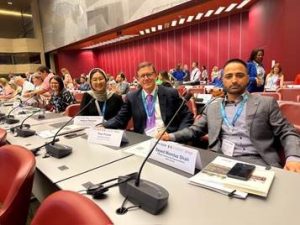Refugee settlement dialogue now led by Australia
Australia has taken on the lead role in the annual United Nations refugee resettlement consultation gathering in Geneva.
Australia is the new chair of the Annual Tripartite Consultations on Resettlement (ATCR), which has been renamed the ‘Consultations on Resettlement and Complementary Pathways’ (CRCP) in recognition of its expanded representation and focus.
At this year’s consultations, held in June, the 250 delegates heard that the number of refugees identified by UNHCR as being in urgent need of resettlement in 2024 had grown to 2.4 million – a 21 per cent increase on the previous year’s projection.
In 2022, fewer than 4 per cent of refugees in urgent need were able to access resettlement, with resettlement departures at 57,483 persons – representing less than 0.2 per cent of the global refugee population at the end of 2022.
In response to growing displacement crisis and refugee resettlement needs globally, the UN refugee agency UNHCR called on nation states to expand and speed up resettlement processes and to increase opportunities for refugees to find long-term safety through other migration pathways.
The consultations heard that while resettlement arrivals globally increased in 2022 on the previous year, the number was still below what was achieved in 2016 when the international resettlement response to displacement from Syria was at its height. 
Of the 21 countries that received resettled refugees in 2022, through both UNHCR and other referral processes, Australia was ranked third with 17,325 arrivals, behind Canada (47,550) and the United States (28,945).
Refugees resettling in Canada, the United States and Australia made up 82 per cent of all resettlement arrivals in 2022, with Canada’s program accounting for 42.6 per cent of global resettlement numbers.
The consultations heard the top three countries of refugee resettlement needs for 2024 were Syria, with 754,000, Afghanistan, with 497,000, and South Sudan, 251,000.
The top countries of asylum were Turkey, with 384,000, Iran, 345,000, and Lebanon, 250,000.
For 2024, the UNHCR retained the same five priority situations for resettlement and is encouraging resettlement states to maintain a strong focus and provide quotas to address the needs of refugees amongst these situations:
Afghan Situation – There are 5.2 million individuals from Afghanistan living as refugees or in a refugee-like situation in the Asia region, primarily in Pakistan and Iran.
The UNHCR has identified 497,000 Afghans in need of resettlement. Coordinated efforts towards durable solutions are being conducted within the framework of the Solutions Strategy for Afghan Refugees (SSAR), whose objectives include “preserving protection space in host countries, including enhanced support for refugee-hosting communities, alternative temporary stay arrangements for the residual caseload, and resettlement in third countries.”
AMES Australia Case Manager made a presentation at the event as part of a panel focused on resettlement and the 2021 exodus of Afghans after the fall of Kabul.
Sayed spoke about Australia’s response to the Taliban’s takeover in 2021 from his experience supporting Afghan evacuees in Adelaide.
He spoke of his team’s work in facilitating health checks, setting up Centrelink and Medicare access, arranging accommodation and establishing a case plan. Sayed said some of the challenges newly arrived refugees face in Australia included housing, cultural and language barrier, low financial mobility, health issues and sponsoring family members left behind.
Rohingya Situation – Since early 2021, political upheaval and conflict in Myanmar have resulted in new displacement, adding to the already protracted situation of refugees from Myanmar throughout Asia.
This includes over one million Rohingya refugees in the region, particularly Bangladesh, Malaysia and India, as well as the over 150,000 Karen, Karenni and other ethnic minorities from Myanmar in Thailand, Malaysia, India and elsewhere in the region.
The UNHCR has identified 240,993 refugees from Myanmar in priority need of resettlement – including 129,000 Rohingya refugees in Bangladesh – and are calling for large-scale group resettlement programs from Bangladesh and Thailand.
Venezuelan Situation – Approximately 106,500 refugees in the Americas region are projected to be in need of resettlement in 2024, with Venezuelans accounting for 75 per cent of these needs. Major host countries include Peru, Colombia and Ecuador.
Syria situation – More than 464,000 refugees are estimated to be in need of resettlement in the Middle East and North Africa (MENA) region.
Syrian refugees account for 86 per cent of the region’s needs as the Syrian crisis extends to its 13th year. Syria tops the resettlement needs list by country of origin for the eighth consecutive year.
Central Mediterranean Situation – The UNHCR has identified over 474,000 refugees to be in need of resettlement across 15 countries of asylum in the East and Horn of Africa Region, West and Central Africa Region and North Africa Region.












